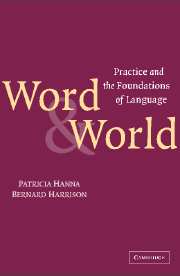Introduction
Published online by Cambridge University Press: 05 June 2012
Summary
Philosophy, as Gilbert Ryle noted long ago, deals characteristically in dilemmas: their exploration and (sometimes) their resolution. Ryle was clearly right. Philosophical puzzlement very often originates in a question – which for some reason seems to us momentous – either answer to which commits us to unpalatable or implausible consequences.
So it is with the question whether “language” in the abstract, language taken as a semantic order, a system of meanings, “mirrors the world”: whether the categories, concepts, structures with which it furnishes us, far from being inventions of the human mind, simply transcribe categories and structures already inscribed in Nature, or Reality. If we answer “yes,” we surely discount, or at least minimise to an implausible degree, the part played by human ingenuity in the constitution of meaning in actual languages. If we answer “no,” by contrast, we seem to be denying the possibility of truth and objectivity. For how are we to describe anything truly, if the terms in which language forces us to frame all that can be said are set, not by the nature of what is to be described, but by linguistic or social convention?
The dilemma is a characteristically philosophical one; one, certainly, which has occasioned the spilling of much ink by philosophers. But its implications transcend the bounds of philosophy, at least philosophy narrowly considered as what goes on in philosophy departments.
- Type
- Chapter
- Information
- Word and WorldPractice and the Foundations of Language, pp. 1 - 14Publisher: Cambridge University PressPrint publication year: 2003
- 6
- Cited by



